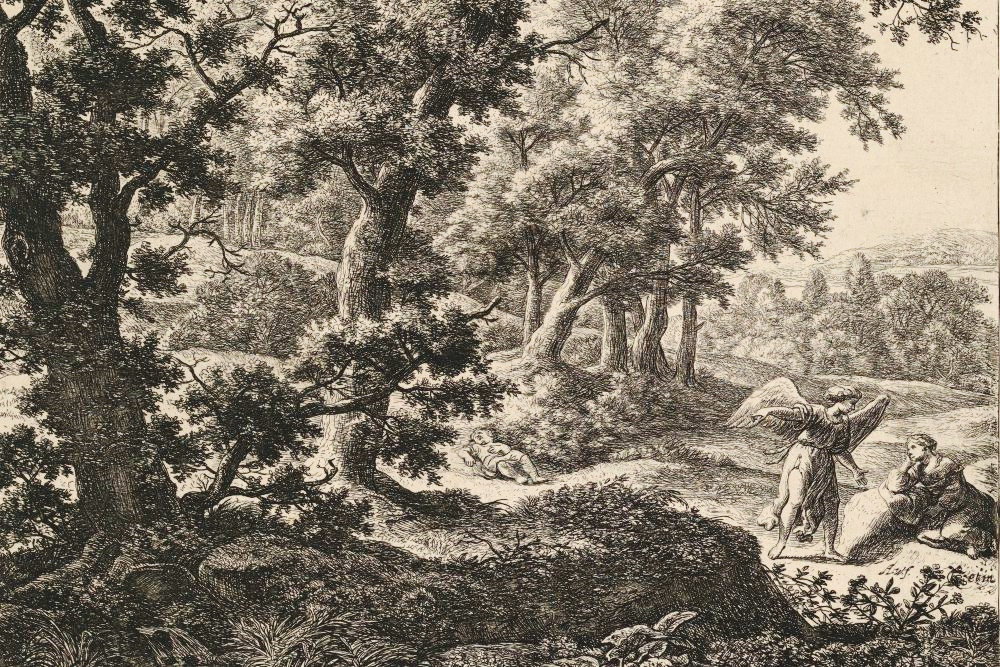
Detail from "Hagar Consoled by the Angel," etching by Anthonie Waterloo, 17th century (Metropolitan Museum of Art)
She stood in front of a crowd of well-dressed young professionals at a chic brandy distillery in downtown Louisville, Kentucky. I could tell she was nervous as she swayed back and forth looking at me with a small smile on her face. Everyone was standing around eager to hear what she had to say.
After she was introduced, she grabbed the microphone then looked up at the crowd and said: "Five to seven minutes isn't long enough to explain miracles, but I'll give it my best shot."
Married for close to five years, I've seen my wife Gillian tell her story of fighting illness with hope more times than I can count. I'm usually among the rest of the crowd wiping tears from my eyes when she finishes. The crowd always floods her with gratitude after she's done, thankful to see life in a new way, thankful for her testimony to joy in hardship, and thankful for the hope she brings.
It's how I imagine Peter felt when Mary Magdalene came running, speaking of an empty tomb. There's hope, the stone is rolled away, despair can be turned into joy.
It's her resurrection story.
St. John Paul II famously proclaimed that, "We are an Easter people and alleluia is our song." As a Christian people, joy is our banner and hope our anthem. However, those words can be elusive concepts until they are grounded in a story that speaks to the present time and place.
Advertisement
The story of Jesus' resurrection was to Jesus' disciples and, in turn, to those early Christians, a story grounded in the present time and place. In the days following Easter, we hear stories of Jesus reappearing to his disciples — not as a ghost but in flesh. We also hear the story of doubting Thomas, where he puts his hands on Jesus' wounds and Jesus teaches, "Blessed are those who do not see, but believe."
Two thousand years later, the story of the Resurrection is as elusive in its meaning as the words of joy and hope. It's something that happened long ago in a foreign land to vagabonds traversing the desert in pursuit of a messiah that would free them of Roman rule. It's hard to imagine it being a story for this time and place.
That is, until we voluntarily — or the pangs of life's burdens compel us to — fall to our knees and have the faith to open our hearts and trust that the story of the Resurrection wasn't meant for a singular time and place at all.
Two days before Christmas last year, I was sitting next to my brother and a very sweet-looking lady in a homeless shelter's chapel singing an off-key version of "Amazing Grace." The deacon playing the piano was a skilled musician, but the piano had seen better days. However, this wasn't Carnegie Hall; it was a humble chapel in the middle of downtown Toledo, Ohio, offering a warm meal and humble accommodations for those needing relief from the bitter winter cold.
After we labored through the verses, my grandfather, who I call my pawpaw, approached the lectern to begin his sermon. He's not a preacher by trade, though he has preached to me at his kitchen table more than a few times. He is, however, part of an organization called the Gideons — known for the Bibles they place in hotel nightstands — and members of his chapter preach at this chapel every so often.
He preached on the root of Jesse, found in Isaiah Chapter 11, a prophetic story of redemption that foreshadows the coming of Jesus. It's a story of a lost kingdom transformed anew through the power of God.
Looking around the room, perhaps realizing his thorough notes on Isaiah's foreshadowing story may be lost on the crowd, he set aside his prepared text and stepped out from the lectern. "I didn't think I was going to do this," he said, "but it's important."
"I know it doesn't look like we have a lot in common, but when I was younger and fresh out of 20 years in the military supervising soldiers and traveling the world, I found myself in a small town in Mississippi cleaning bathrooms and barely making enough money to provide for my three children and my wife."
I've heard my pawpaw tell a million stories, but sitting there in that homeless shelter, two days before Christmas, I heard this 82-year-old man tell a story I've never heard.
"Finally, I had enough," he continued. "I got down on my knees and I said, 'Jesus, I know we've had a complicated relationship and I haven't always been the man I should be, but today I give you my life and will follow wherever you lead me.'"
Three days later, he was offered a job as a security officer for a nuclear power company that eventually led to moving north and working as the corporate head of security for their many power plants around the country. From hopelessness and desolation came a new story through the power of Jesus Christ.
It was the first time I heard his resurrection story.
As the song asks, we weren't there when they crucified our Lord. Nor were we there when they laid him in the tomb or when he rolled away the stone. However, as the song suggests, we've felt what it means to be left alone, to be crucified for wrongs never committed, to see a friend gone too soon, to be adrift amid the storms of life, to fall to our knees from the burden of our own expectations, to tremble.
The Gospel news — the good news — is that the resurrection story didn't end when Jesus rolled away the stone. That's where it began. And if we are willing to dive deep into our own desolation in search of God, he will be there waiting to walk us out and make our lives new.
Our own resurrection stories start in the desolation of Good Friday but always end, through the transformative power of God, in the joy and hope of Easter Sunday.
[Christian Mocek is the director of annual giving at St. Meinrad, a Benedictine monastery, seminary and school of theology. He lives in New Albany, Indiana, with his wife and son.]
Editor's note: We can send you a newsletter every time a Young Voices column is posted to NCRonline.org. Go to this page and follow directions: Newsletter sign-up.






